We're celebrating the centennial of Shelley Winters. Here's Cláudio Alves…
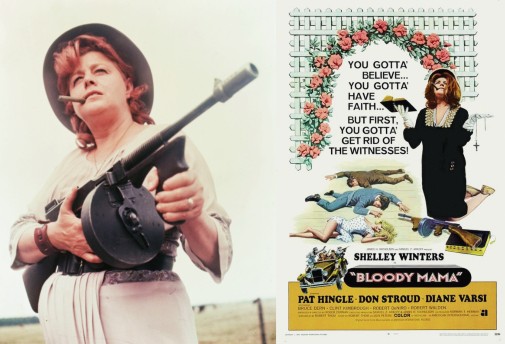
In October 1966, less than six months after her second Best Supporting Actress Oscar win, Shelley Winters appeared in two episodes of the Batman TV show. Winters once again played a villainous mother. Unlike most Batman villains though, Winters' Ma Parker wasn't based on a comic book character but a historical figure. Kate Barker, commonly known as Ma Barker, was the matriarch of a criminal family who terrorized Arizona during the first decades of the 20th century. Boisterous, vicious, merciless, and bad to the bone, this monster mother was, in many ways, a perfect role for Shelley Winters in this period of her career.
It's no wonder then, that four years after the Batman episodes had aired, Winters returned to the iconic part. This time, however, there were no euphemisms or layers of superhero camp between the actress and the character. Roger Corman's Bloody Mama is a biopic of Ma Barker that, more or less, follows the historical narrative. That being said, if you think this is any sort of stuffy Oscar baity prestige picture, you are terribly mistaken...
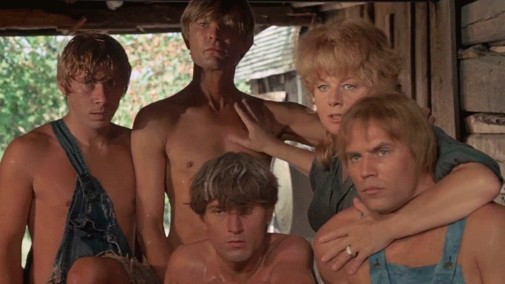
Like a lot of Corman productions, Bloody Mama is a small-budget indie with pretensions of an exploitation cult-following. This is obvious from the first scene, which dramatizes the rape of young Kate Barker by her father and older brothers. It's a shameless way to start the movie, one that shocks and provokes, especially when considering that the flick featured a two-time Oscar-winning actress in the titular role. Any expectation of middlebrow drama is shot, killed, and buried immediately, and the subsequent few scenes after the credits aren't any gentler on the spectator. Flashing forward some decades, Corman finds Barker as the mother of four adult sons whom she bathes like babes and uses to satisfy her sexual appetites.
All that being said, it'd be wrong to characterize Corman's approach as a mere provocation. While the entertaining value of these vile scenarios played in outrageous style is difficult to deny, one quickly sees that the director is looking for something deeper than Grand Guignol. The victimization of young Kate Barker becomes a means for the audience to understand the behavior of her adult self. It's a Rosetta Stone through which we are meant to see Ma Barker's villainy as the consequence of generations of abuse. For her part, Shelley Winters happily follows the director's lead, shading the bombast of her performance with quiet instances of sorrow, finding poignancy amid the circus of horrors.
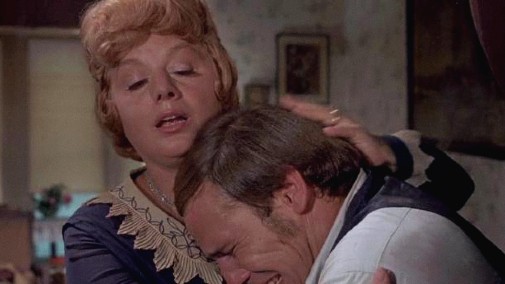
I sometimes have issues with Shelley Winters onscreen. She's a bold actress who likes to take risks and is deeply unafraid of ridicule. Yet that admirable attitude doesn't always result in good performances. Often, I find that she can invest too much in the cartoony excess of a character and forget to flesh out more grounded elements of a role. In Bloody Mama, though, she's beyond perfect. Both the actress and the director know what her strengths are and they weaponize qualities and fragilities alike, modulating the screen persona until it's an integral part of the movie. Instead of trying to squeeze Winters into his pre-existing vision, Corman seems to have built Bloody Mama around the star.
Seeing her interact with her boys is especially strange, as her open disdain dances with obsessive love, a whiff of Oedipal obsession mixed with the mercenary pragmatism of a gang leader. There's tenderness too. See her short scenes with the father of her children, a tear in her eye, and a rueful mask hiding disappointment. Or, better yet, the many instances when Ma Barker consoles a crying son by drawing the weeping murderer to her bosom. All of this coalesces into one of the creepiest portraits of maternal devotion Hollywood has ever produced, and that's not even factoring in the fearless ways in which Winters plays Barker's criminal activities. For example, the actress has never been more chilling than when Ma Barker emotionlessly drowns a poor woman her boys had kidnapped.
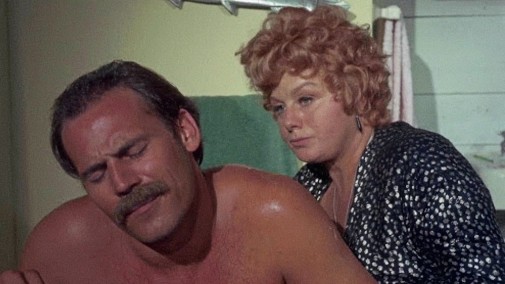
Winters won her Oscars for supporting roles, but she should have been a contender for the Best Actress statuette back in 1970. If I had any doubts about the matter, they were quickly dispelled once Bloody Mama entered its last and cruelest act. When one of her beloved sons (played by a young Robert De Niro) dies, Ma Barker starts imploding before our eyes. Still speaking with her heavy accent, each word coated in sticky molasses, the woman unravels in paroxysms of grief-stricken vulgarity. It's both garish and heartbreaking, delicious and foul, like a ripe fruit that's so sweet we can practically taste the rot blooming in the sugary flesh. In her last moments, the actress delivers the most multifaceted performance of her career, fully surrendering herself to the anguish that spews out of Ma Barker's heart as the Angel of Death approaches.
In Bloody Mama, Shelley Winters is a force of nature!
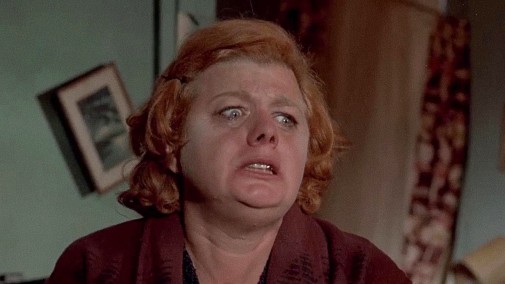
Thank you for attending TFE's Shelley Winters Centennial!
Nathaniel on The Starlet in A Double Life (1947)
Eric on The Pro in Lolita (1962)
Nathaniel on The Champ in A Patch of Blue (1965)
Claudio on The Actor's Actor Bloody Mama (1970)
Baby Clyde on The Old Crone Pete's Dragon (1977)
Glenn Dunks on The Memoirist "Shelley II" (1989)